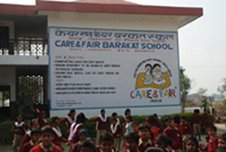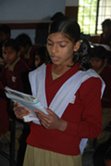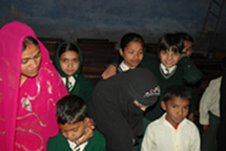Contribute
| Lokvani Talks To Arti Pandey On Barakat, Inc. |
Nirmala Garimella
03/02/2008
Arti Pandey did her dissertation at Boston University on the topic of ‘Child labor practices in the Oriental carpet industry of India.’ "I did my research in collaboration with Barakat in India, and volunteered with them for the duration of my education". Having completed her doctoral studies last year in September, she joined Barakat Inc, working with them full-time as Project Manager as of November 15th 2007. She had visited their schools in India and Afghanistan previously, and was familiar with the staff and the operations of the organization. Consequently, she says, working with them was a natural progression.
What does Barakat mean in Afghanistan ? Give us some background on who founded it and how you got involved ?
The word ‘Barakat’ means ‘blessing’ in Urdu, Arabic, Dari (national language of Afghanistan) and Farsi.
The organization was started by the collaborative effort of Chris Walter and Habibullah Karimi, two men who started the vegetable dye carpet revival in Afghanistan back in 1987. They went on to become successful businesspeople – Chris Walter set up as a wholesaler of Oriental carpets in Massachusetts (www.yayla.com) and Habibullah Karimi founded his own company in Afghanistan where he is in-charge of production processes. Both men wanted to give back to society and started the first Barakat school in 1994 in Attock, Punjab, Pakistan. That was the beginning of the organization which has now grown to 7 schools – three in Attock, state of Punjab, Pakistan; 2 in Bhadohi, state of Uttar Pradesh, India; and 2 in Afghanistan – in Andkhoy, Faryab Province* & Aqcha, Jowzjan Province. We also run 23 Literacy Courses for girls and women in Afghanistan where it is a continuing challenge to provide female education since parents are reluctant to send girls outside the four walls of the house. These restrictions become even more stringent when the schools in question may have male teachers, and boys as students. Barakat serves nearly 3000 students and has 120 people as field staff, including school staff, in the three countries of India, Pakistan and Afghanistan.
The story of Azaad is very moving? How does the family survive now that the father is not alive?
Azaada’s family is surviving on help from relatives. They are unfortunately, using up the resources they had saved over the years when Kamil Khan was alive and working. Like in India, there is no social security and people must turn towards their own social network for help at times like this. Barakat is going to try and sponsor Azaada and her sister’s education as part of a Girls’ Scholarship Program that we are going to institute. The program will allow ten-eleven girls to continue their higher education in school and/or university, depending on their level of education. Each girl’s education for one year will cost only $550.00, and we are hoping to get sponsors for each of the girls.
How is the NGOâ€s access to these places? Are they allowed safe access and resources for their work?
Barakat works through local staff who know the local languages and customs. Barakat Afghanistan has an office in Kabul, and one in Andkhoy, Faryab district. We have staff in both places who reside in Kabul and Andkhoy respectively. Faryab district is populated by Uzbek and Turkmen ethnicities who have never supported the Taliban. However, it is hard to ascertain absolutely hundred percent ‘safe access’ in Afghanistan, irrespective of which part of the country you are working in. Our staff do take adequate precautions, and possibly, the biggest factor that ensures their safety is the fact that they are locals, and not foreigners. We have needed resources for our work – transportation can indeed be a problem in the winter months when the road from Faryab province to Kabul is closed due to heavy snowfall, but at other times of the year it has been possible to get the resources we need both for construction and day-to-day functioning of our schools in the North of Afghanistan.
How do you work with the artisans in the rug making while giving them adequate support and compensation?
In India, Pakistan and Afghanistan the communities where schools are located are also communities where carpet-making is the primary profession. Consequently, all our schools and Literacy Courses attract children from households where the family relies on carpet-making for its livelihood. Often these people have no other free and good alternative for providing an education to their children. Barakat educational institutions are deliberately located in areas where we can serve the carpet making community, and we get at least 90% of our students from among them.
In these schools, we also endeavor to provide other services like health check-ups and treatment for children. In Afghanistan, we are starting an anti-smoking campaign in order to educate young children and their mothers about the hazard of smoking, which is a growing addiction for women curtailed behind the purdah.
Barakat is also involved in India? What made you choose this region when your focus is in Afghanistan and Pakistan?
No, we are not focused solely on Afghanistan and Pakistan. It is true that those are the countries where our work originated, but we started in India in 2000. What we are striving towards is the concept of a united South Asia – one where we do not identify ourselves solely by nationality, but also as citizens of a larger unified region, which has common and inter-linking roots in history, culture, arts, crafts, religion and now, in terms of the problems and challenges unique to this part of the world.
That Barakat would start work in India as well was a given well before we could actually begin. Finally, we began when an opportunity arose with Care & Fair, a German NGO that makes schools to serve carpet making communities as well. They were in the process of building a school in Laxmanpatti, Bhadohi district, and ran out of funds. At that point, Barakat stepped in and completed construction of the school. Since, we have been funding the school entirely, and will now be taking a more active position with regards to the management of the institution as well. We are also making our own school in Qazipur, Bhadohi and the building should be ready for the existing classes (being held in a rented building) to move in this July.
As a matter of fact, in the coming years we envision a much greater role for Barakat in India, where the political and social atmosphere for growth is much more conducive to our development. The need in India is immense too, and the benefits of women’s education are far-reaching as research has shown.
What are the opportunities for people in Boston to get involved with Barakat? How can they help?
In Boston Barakat is currently focused on fund-raising for its programs in all three countries. Consequently, we are planning a Barakat Literacy Walk for October this year. For the purpose, we are in need of volunteers who would be interested in giving us their time.
Also, we would appreciate help from people who can translate documents from English to Urdu and English to Dari, since this will reduce the amount of work that Barakat office staff in Pakistan and Afghanistan have to do – they do have their hands full even as things stand.
Lastly, I would like to direct anyone who is interested in contributing to our website’s ‘Get Involved’ section: http://www.barakatworld.org/help.html
To read Raza's story goto www.barakatworld.org
You may also access this article through our web-site http://www.lokvani.com/
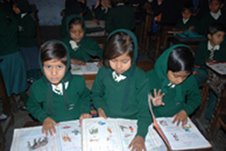
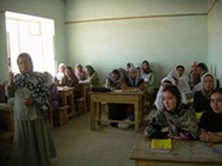
A Literacy Course in Kabul, Afghanistan. This one is populated mostly by older girls and women, though often there are young girls as well in these courses
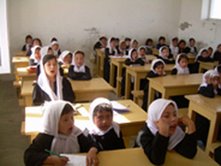
Class in progress in Aqcha, Faryab Province, Afghanistan
